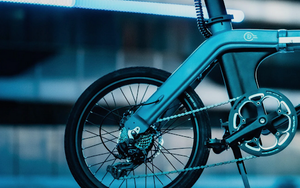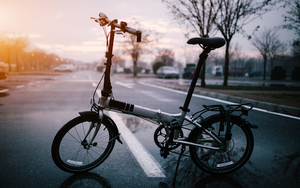Are Electric Scooters Noisy?
Nov 14, 2023
List of Contents
- Are electric scooters noisy?
- Understanding the noise levels of electric scooters
- Factors influencing the noise level
- Comparing noise levels: Electric scooters vs. traditional scooters
- Noise regulations for electric scooters
- The impact of electric scooter noise on the environment
- Reducing noise from electric scooters
- Statistics on Electric Scooters
Electric scooters have gained popularity in recent years as a convenient and eco-friendly mode of transportation. However, concerns about their noise levels have also been raised. In this article, we will explore the science behind electric scooter noise, compare it with traditional scooters, discuss noise regulations, examine its impact on the environment, and look at ways to reduce noise emissions.
Understanding the Noise Levels of Electric Scooters
When electric scooters are in operation, they produce noise due to various factors. One of the primary sources of noise is the motor itself. The electric motor, similar to the ones found in electric cars, converts electrical energy into mechanical motion, resulting in vibrations that generate sound waves.
However, the noise generated by electric scooters is not solely attributed to the motor. It also comes from the interaction between the tires and the road surface. As the tires roll, they create friction, and this friction produces noise. The type of tires used can have a significant impact on the noise levels, with some tires designed to minimise noise while others may create more noise.
Additionally, other components of the electric scooter can contribute to the overall noise levels. The braking system, for example, can produce noise when engaged. The transmission system, responsible for transferring power from the motor to the wheels, can also generate noise during operation.

Factors Influencing the Noise Level
Several factors can influence the noise level of electric scooters.
Speed
One of the main factors is the speed at which the scooter is travelling. Generally, the faster the scooter goes, the higher the noise level. This is because as the scooter accelerates, the motor works harder, resulting in increased vibrations and noise production. With a top speed of 20mph, the E-Dash LE1 electric scooter makes for perfect urban commuting.
Terrain
Another factor that affects the noise level is the terrain on which the scooter is being ridden. Uneven surfaces, such as cobblestones or gravel roads, can amplify the noise. The vibrations caused by the scooter's interaction with these rough surfaces can reverberate and create a louder noise compared to smooth pavement.
Scooter Design
The design of the scooter also plays a significant role in noise levels. Factors such as aerodynamics can influence how air flows around the scooter, potentially reducing noise. The placement of the motor within the scooter's frame can also impact noise levels, as certain positions may dampen vibrations more effectively. Additionally, the type of tires used, whether they are solid or pneumatic, can affect noise production. The Kugoo G2 Pro electric scooter has pneumatic tyres for reduced noise and off-roading.
Condition of Scooter
Furthermore, the level of maintenance and the quality of the scooter's components can influence noise levels. Regular maintenance, such as lubricating moving parts and ensuring proper alignment, can help reduce noise. High-quality components, such as well-insulated motors and noise-reducing materials, can also contribute to a quieter riding experience.
In conclusion, the noise levels of electric scooters are influenced by various factors, including the motor, tire-road interaction, and other components. Speed, terrain, scooter design, maintenance, and component quality all play a role in determining the overall noise produced. By understanding these factors, manufacturers and riders can work towards minimising noise pollution and creating a more enjoyable and peaceful urban environment.

Comparing Noise Levels: Electric Scooters vs. Traditional Scooters
Noise Emission from Electric Scooters
Compared to traditional scooters powered by internal combustion engines, electric scooters generally produce less noise. According to a study conducted by the National Highway Traffic Safety Administration (NHTSA), electric scooters emit an average of 45-50 decibels (dB) of noise at a distance of 50 feet during normal operation. This level of noise is comparable to a quiet conversation or a humming refrigerator.
Noise Emission from Traditional Scooters
In contrast, traditional scooters powered by internal combustion engines can produce significantly higher noise levels. According to the NHTSA study, these scooters emit an average of 78-82 dB at a similar distance. This level of noise is comparable to a vacuum cleaner or heavy traffic noise.

Noise Regulations for Electric Scooters
Global Noise Standards for Electric Scooters
Noise regulations for electric scooters vary across different countries and regions. In the European Union, electric scooters must comply with the European Union Noise Directive, which sets limits on noise emissions for different vehicle categories, including scooters. In the United States, the Environmental Protection Agency (EPA) has noise emission standards for motorcycles, which also apply to electric scooters.
Noise Control Measures in Urban Areas
Many cities around the world have implemented noise control measures to address noise pollution from various sources, including electric scooters. These measures may include designated quiet zones, restrictions on certain hours of scooter operation, and educational campaigns to raise awareness about noise pollution and its effects on human health and well-being.
The Impact of Electric Scooter Noise on the Environment
Noise Pollution and Its Effects
Noise pollution generated by various sources, including transportation, can have detrimental effects on both human health and the environment. Excessive noise can contribute to stress, sleep disturbances, hearing loss, and other health issues. It can also disrupt wildlife habitats and interrupt their natural behaviour patterns.
Electric Scooters and Urban Noise
Given their increasing popularity in urban areas, electric scooters can contribute to the overall noise levels in cities. However, due to their quieter operation compared to traditional scooters, electric scooters are generally considered to have a lower impact on urban noise pollution.

Reducing Noise from Electric Scooters
Technological Advances for Quieter Scooters
Manufacturers have been investing in research and development to reduce the noise emissions of electric scooters. Advancements in electric motor technology, tire design, and overall scooter engineering have helped to minimise noise levels. For example, the use of brushless motors and noise-cancelling technology can significantly reduce vibrations and noise.
User Tips for Minimising Noise
Users can also take steps to minimise the noise emitted by their electric scooters. Maintaining proper tire pressure, regular servicing of the scooter, and using smooth surfaces for riding can help reduce tire-related noise. Additionally, riding at moderate speeds and avoiding sudden acceleration or aggressive braking can also contribute to a quieter riding experience.
In conclusion, while electric scooters do produce some noise, they generally emit lower levels of noise compared to traditional scooters powered by internal combustion engines. Noise regulations and control measures are in place to address noise pollution from electric scooters, and advancements in technology continue to make electric scooters quieter. By understanding the factors influencing noise levels and adopting noise reduction strategies, electric scooter users can contribute to a quieter and more sustainable urban environment.






